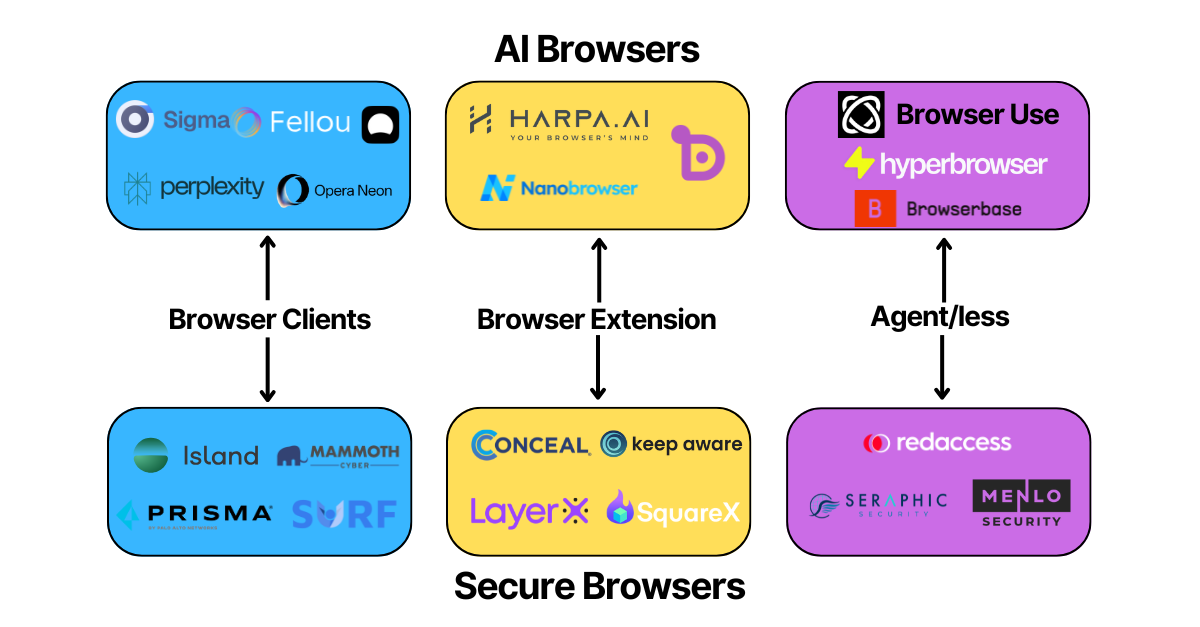There are clear parallels between Secure Browsers and AI Browsers
I find it rather funny that browsers have been remained largely untouched for what seems like forever in IT. But now, not only do we have a secure version of browsers for enterprise use, but also browsers with LLM features baked in. We went from not enough browsers to too many browsers in two years.
Secure Browsers were obviously first, with this iteration of the technology (i.e. not RBI) coming to market in ~2022. AI Browsers are the cool new 2025 thing, but have a like-for-like resemblance of Secure Browsers.
Secure browsers like Island, Prisma Access Browser, Mammoth, SURF, are giving us new browser clients, often based on Chromium. Considering that most people (and organizations) either go for the browser that comes with their OS or Chrome, having a new browser client can be interpreted as being quite disruptive.
However, these secure enterprise browsers give you so many security benefits that I’d put them in the top of endpoint security products. Google and Microsoft realized this potential and are offering secure versions of their products too.
To address the disruption issue, we have solutions that deliver browser security via an extension. These include LayerX, SquareX, Conceal, Seraphic, and Keep Aware. For those who are not happy with a browser extension either, you have some agentless or cloud-based solutions, like those provided by Menlo or RedAccess.
In short, you’ve got three ways to deliver secure browsing:
Browser clients
Browser extensions
Agentless security
AI Browsers walk the same deployment path
I’ve recently started looking at the AI-native equivalents of enterprise IT products, and browsers popped up rather early in my Google searches. I knew about Perplexity’s Comet, but a lot of other products promise a similar thing. The messaging was naturally confusing, but I slowly started seeing parallels with the secure browser market from above.
AI Browsers come in the following shapes:
AI Browser clients - Fellou, Perplexity’s Comet, Dia browser, Sigma, Opera Neon
AI Extensions -Harpa AI, NanoBrowser, Do Browser
Headless browsers/agent browsers - Browser Use, Browserbase, Hyperbrowser
AI Browser clients
AI Browser Clients are full-fledged browsers (like Fellou, Perplexity Comet, Dia, Sigma, and Opera Neon) that embed AI agents directly into the browsing experience, giving consumers a GUI-first way to search, summarize, automate tasks, and even act on web pages.
AI Browser Extensions
AI Browser Extensions (such as HARPA AI, NanoBrowser, and Do Browser) are add-ons for existing browsers like Chrome or Edge that bring AI assistance into the browsing activities. They provide overlays or omnibar-driven commands for tasks like summarization, drafting, automation, and lightweight agentic actions.
Headless AI browsers for Agents
This is a the equivalent of the ‘agentless security’ deployment model. I had to choose between Agentless/Headless or Agentless/Agent. I think they’re both good options to illustrate the idea.
Headless Browsers (like Browser Use, Hyperbrowser, and Browserbase) are not inteded for end-users, but rather for LLM agents. These are tools for developers and enterprises that allow AI agents to control a headless browser programmatically. They run without a GUI and are optimized for large-scale automation, scraping, data extraction, and complex multi-step web interactions, often provided as APIs or SDKs.
Next, Secure AI Browsers
The next obvious step is for these two categories to merge. I expect secure browsers to start offering AI productivity features. Some may already do.
It is much more likely to have secure browsers delivering AI features than the other way around. Security is much harder to get right and a much longer exercise. Some UX changes to include an API call to Anthropic is not as difficult.
The broader observation has to do with the browser deployment itself. So far we have three deployment models that appear to be exhaustive, so any innovation will be built using one of the three deployments.
As someone who used Opera from 2006 to 2017 until I had Chrome force fed, I’m stoked for Opera Neon. If I weren’t so AI-adverse, maybe I’d even finally move away from Chrome.


